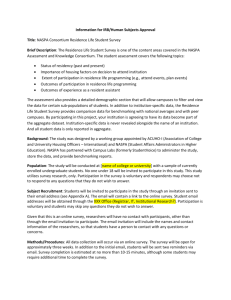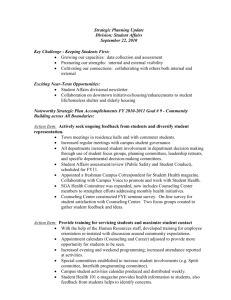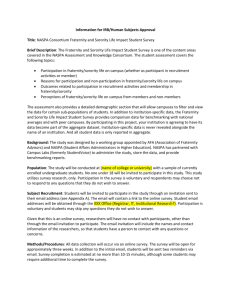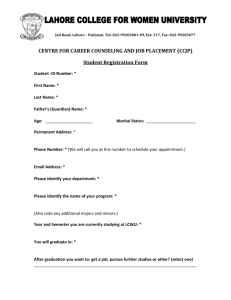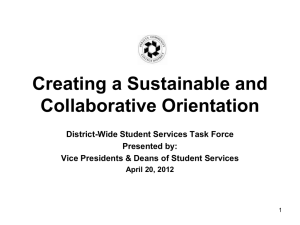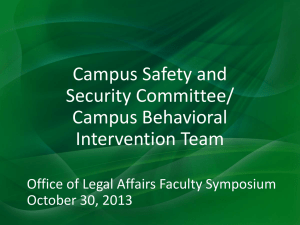Mental Health and Counseling IRB Protocol
advertisement
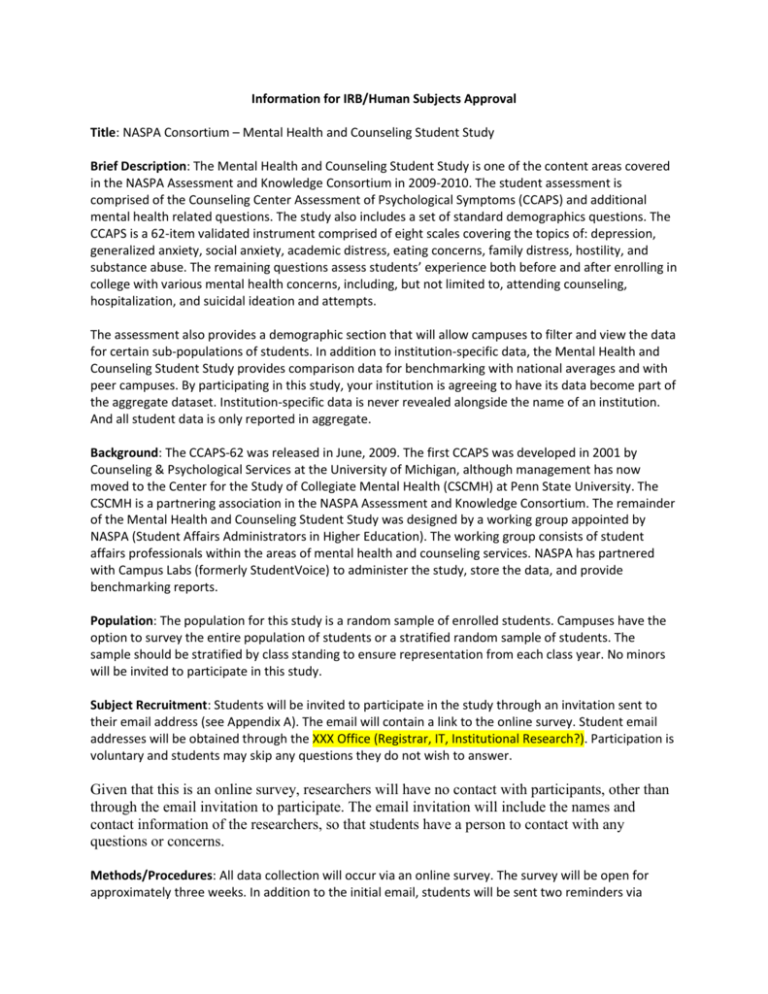
Information for IRB/Human Subjects Approval Title: NASPA Consortium – Mental Health and Counseling Student Study Brief Description: The Mental Health and Counseling Student Study is one of the content areas covered in the NASPA Assessment and Knowledge Consortium in 2009-2010. The student assessment is comprised of the Counseling Center Assessment of Psychological Symptoms (CCAPS) and additional mental health related questions. The study also includes a set of standard demographics questions. The CCAPS is a 62-item validated instrument comprised of eight scales covering the topics of: depression, generalized anxiety, social anxiety, academic distress, eating concerns, family distress, hostility, and substance abuse. The remaining questions assess students’ experience both before and after enrolling in college with various mental health concerns, including, but not limited to, attending counseling, hospitalization, and suicidal ideation and attempts. The assessment also provides a demographic section that will allow campuses to filter and view the data for certain sub-populations of students. In addition to institution-specific data, the Mental Health and Counseling Student Study provides comparison data for benchmarking with national averages and with peer campuses. By participating in this study, your institution is agreeing to have its data become part of the aggregate dataset. Institution-specific data is never revealed alongside the name of an institution. And all student data is only reported in aggregate. Background: The CCAPS-62 was released in June, 2009. The first CCAPS was developed in 2001 by Counseling & Psychological Services at the University of Michigan, although management has now moved to the Center for the Study of Collegiate Mental Health (CSCMH) at Penn State University. The CSCMH is a partnering association in the NASPA Assessment and Knowledge Consortium. The remainder of the Mental Health and Counseling Student Study was designed by a working group appointed by NASPA (Student Affairs Administrators in Higher Education). The working group consists of student affairs professionals within the areas of mental health and counseling services. NASPA has partnered with Campus Labs (formerly StudentVoice) to administer the study, store the data, and provide benchmarking reports. Population: The population for this study is a random sample of enrolled students. Campuses have the option to survey the entire population of students or a stratified random sample of students. The sample should be stratified by class standing to ensure representation from each class year. No minors will be invited to participate in this study. Subject Recruitment: Students will be invited to participate in the study through an invitation sent to their email address (see Appendix A). The email will contain a link to the online survey. Student email addresses will be obtained through the XXX Office (Registrar, IT, Institutional Research?). Participation is voluntary and students may skip any questions they do not wish to answer. Given that this is an online survey, researchers will have no contact with participants, other than through the email invitation to participate. The email invitation will include the names and contact information of the researchers, so that students have a person to contact with any questions or concerns. Methods/Procedures: All data collection will occur via an online survey. The survey will be open for approximately three weeks. In addition to the initial email, students will be sent two reminders via email. Survey completion is estimated at no more than 10-15 minutes, although some students may require additional time to complete the survey. Researchers will have access to the data in real-time as it is being collected through a secure, passwordprotected reporting site. Data encryption and other measures will ensure the security of the data (see below for full security details). All data will be compiled in aggregate and no individual respondents will be identified. Data will be available through the online reporting site for an indefinite amount of time unless the campus instructs NACA/Campus Labs to purge their data. Once all participating campuses have completed data collection, benchmarking reports will be available through the same secure, password-protected reporting site. At no time will a campus name be linked to any data reported in the benchmarking report. Data will be analyzed using quantitative methodologies. In almost all instances, only descriptive statistics will be reported, however, when appropriate more advanced quantitative data analysis may take place. Informed Consent: Students will be asked to provide their consent through the email invitation to participate in the survey (Appendix A). If having the informed consent in the email only is not sufficient, a separate start page will be added as the first page of the online survey that allows respondents to check a box that they understand that they are providing their informed consent. Anonymity/Confidentiality: No individual response to the survey will ever be identified in any report. Rather, all resulting data will be reported in the aggregate. To allow for reminder emails to be sent to only non-respondents, the survey is not anonymous. Each possible respondent is sent a unique link that is tied to their email address. However, all identifiable information will be visible only to the email server and is blocked from viewing by all others. The administration of the survey can be dictated by institutional requirements related to anonymity and confidentiality in that all reminders can be sent to the entire sample if the campus does not wish to have unique/identifiable links sent to each possible respondent. Risks/Benefits: While survey research presents minimal risks, students may be uncomfortable answering some of the questions. Participation is voluntary. Students may opt to skip any questions that they do not wish to answer. If students do experience any discomfort, they will be encouraged in the email invitation to contact the researchers. The survey provides a better understanding the characteristics, perceptions, and attitudes of college students and will result in direct benefits for students, such as enhanced programming efforts. Deception: Deception will not be used in this study. Compensation: Students will not be compensated for completing the survey. [If incentives are being used, insert information here]. Only students who complete the online survey will be eligible for the incentives. Data Security: All data will be stored through Campus Labs servers and will only be accessible through a unique username and password. Campus Labs has implemented various security measures at the application, network, and physical level to ensure that data will not be compromised. At the application level, several security measures and coding standards are in place such as code to guard against common hacking techniques, rules related to strength of passwords, and staying up-to-date on all security and release updates. Protection at the network level includes features such as dual firewalls, SSL encryption and 24/7 monitoring. Campus Labs servers are housed within a Class A Data Center, compliant with TIA standards. The servers are always staffed, have three-tiered access points, and 24/7 camera surveillance. Appendix A: Informed Consent and Invitation to participate in the Mental Health and Counseling Student Survey Sender (who the mailing appears to be from): Name of Institutional Contact Person, Office, or Program Reply-to email address: This can be a StudentVoice email address, but please note that this account is not checked. We recommend that someone at your campus who can answer student questions serve as the reply-to address (e.g., officeordepartment@yourcampus.edu) Subject line: Dear STUDENT, You have been randomly selected by INSTITUTION NAME to complete a survey related to mental health and counseling services. This national survey of college students will provide INSTITUTION NAME with information on your experience with various issues related to mental health and counseling both onand off-campus. Data collected from this project will be used by administrators to make informed decisions about programming and/or policies that can impact you and your peers. Some of the questions in this survey will cause you to focus your attention on your emotions and may cause temporary discomfort. If you feel this discomfort will be lasting or if your discomfort is extreme, please refer to the campus resources listed below or contact the study administrator listed below. Participation in this survey is voluntary and you may choose not to answer any question with which you are uncomfortable. The survey will take you less than 10 minutes to complete. If you complete the survey by INSERT DATE, you will INSERT INCENTIVE INFORMATION HERE. Please note that all of your responses will be kept completely confidential and all resulting data will only be reported in the aggregate. By clicking on the link below you are indicating your willingness to participate in the survey. StudentVoice will insert the survey link with instructions on taking the survey here. Thank you in advance for your participation! If you have any specific questions about this survey, please contact INSTITUTIONAL CONTACT NAME AND CONTACT INFORMATION. Best Regards, INSTITUTIONAL CONTACT NAME INSTITUTIONAL CONTACT TITLE INSTITUTIONAL CONTACT IFORMATION INSERT REFERRALS TO CAMPUS COUSELING RESOURCES
